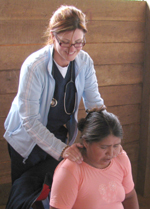|
|
|

|
Nurse feels call to help Hispanic patients
|
by Megan Fink
Public Relations
A trip to the emergency room can be a nerve-wracking experience for
anyone. Now imagine you don’t speak the native language. MUSC
interpreters like Mille Pochet, R.N., not only ensure health safety and
quality medical care by translating vital health information, but ease
the anxiety of patients with limited English proficiency.
 Mille Pochet
performs massage therapy on a Peruvian patient. Pochet and a nine other
medical volunteers treated hundreds of patients as part of a mission
trip in 2009. Mille Pochet
performs massage therapy on a Peruvian patient. Pochet and a nine other
medical volunteers treated hundreds of patients as part of a mission
trip in 2009.
Helping the local Hispanic population admitted to MUSC, especially in
Labor & Delivery, sparked Pochet’s interest in nursing. “You’re a
hero everywhere you go as an interpreter,” said Pochet. “You are the
work line to the doctors and nurses. I began to feel I could do even
more to help by becoming a nurse.”
Pochet’s Spanish savvy also earned her a spot on a medical mission team
that traveled to remote areas in Peru in 2009. She was only one of two
students asked to join the trip that served more than 800 patients in
six days. In addition to triaging, educating and assisting in the
treatment of Peruvians, she served as the group’s interpreter.
“Anything a student can do to serve a community outside their comfort
zone is beyond enriching and gives you perspective,” said Pochet.
Closer to home, Pochet serves as a Hispanic Health Initiative member
working with a rural mission center on Johns Island to provide medical
resources and education to the families of migrant workers. Volunteers
have collected personal first aid kits and children’s books for the
migrant families, helped them draft safety and nutritional plans, and
hosted informational sessions with local experts. Popular topics
include mental health, alcoholism, the location of medical resources,
and preventative medicines and exams.
Pochet’s work with the Lowcountry Hispanic community earned her the
Annual Circulo Hispanoamericano de Charleston Grant Award in 2009.
In addition to her interpreting services, Pochet is a teaching
assistant for Carole Bennett’s, Ph.D., R.N., women’s health study on
the effects of stress on mental well-being. Her focus in this subgroup
is on the reproductive stresses and its effect on a woman’s mental
health.
“Working with Millie Pochet and teaching her is like getting an
unexpected surprise,” said Bennett. “She has a perspective on life that
is a gift. At the College of Nursing, we are very proud of having her
as one of our students and know that the lives she touches will be
enriched.”
When Pochet is not in the hospital, clinic or classroom, she enjoys
exercising, photography, massage therapy, and movies. What Pochet finds
most satisfying, however, is helping people and relieving their pain.
Pochet is applying for a position in Women’s Health and Perinatal
Services at MUSC, and she hopes to continue her work as an interpreter.
She also plans on pursuing a doctorate of nursing practice and is an
advocate for a midwifery program at MUSC.
Friday, May 21, 2010
|

|
The Catalyst Online is
published
weekly by the MUSC Office of Public Relations for the faculty,
employees and students of the Medical University of South Carolina. The
Catalyst Online editor, Kim Draughn, can be reached at 792-4107 or by
email, catalyst@musc.edu.
Editorial copy can be submitted to The Catalyst Online and to The
Catalyst in print by fax, 792-6723, or by email to catalyst@musc.edu. To place an ad
in The Catalyst hardcopy, call Island Publications at 849-1778, ext.
201.
|
|
|
|

